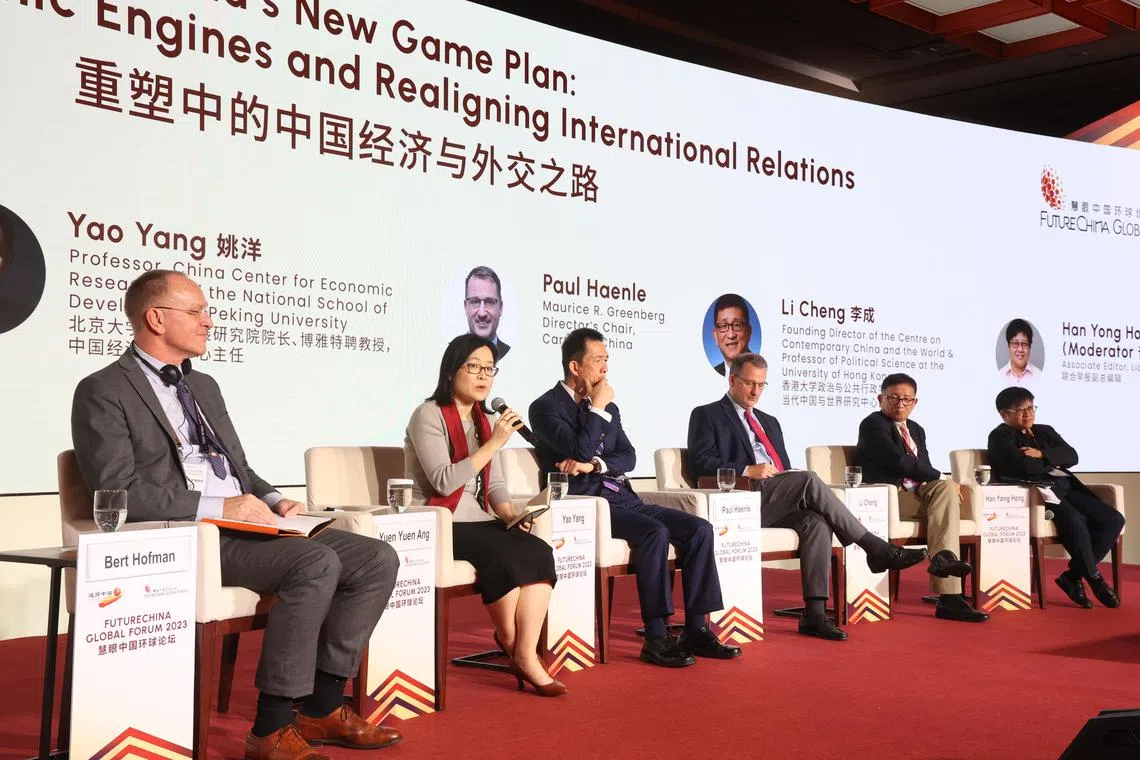China’s economy not all doom and gloom, say academics at FutureChina forum
Sign up now: Get ST's newsletters delivered to your inbox

Speakers at a panel on "China's New Game Plan: Reigniting Economic Engines and Realigning International Relations" at the FutureChina Global Forum, in Singapore on Oct 27.
PHOTO: LIANHE ZAOBAO
Follow topic:
SINGAPORE - Despite the negative press on China’s economy in recent months, it is not all bleak, said speakers at a forum about China on Friday.
They cited its short-term stimulus measures, underlying economic potential and its long-term strategy as reasons for optimism.
They were speaking at the FutureChina Global Forum 2023 organised by Business China, a non-profit organisation which aims to strengthen ties between Singapore and China.
The forum was held at the Sands Expo and Convention Centre in Singapore, with Deputy Prime Minister and Coordinating Minister for Economic Policies Heng Swee Keat as its guest of honour.
Professor Yao Yang of Peking University said the “surprise” stimulus measures announced by Beijing this week would be effective. He was speaking at a panel discussion on “China’s New Game Plan: Reigniting Economic Engines and Realigning International Relations”.
On Tuesday, China’s National People’s Congress approved a one trillion yuan (S$191 billion) sovereign bond issuance
It also formalised a process that allows local governments to borrow funds for the year ahead, starting in the preceding fourth quarter, that would run till the end of 2027. Analysts estimate that this early issuance of funds could be worth up to 2.7 trillion yuan, US news network CNBC reported.
Prof Yao, who is director of the China Centre for Economic Research at Peking University, said the sovereign bond issuance, coupled with the framework that eases financing for local governments, form a “3.7 trillion yuan stimulus package” which he believed “is going to work”.
He said China still has growth potential, citing its expertise in artificial intelligence, alternative energy and electric vehicles – “sectors which are going to dominate the economy” in the future.
China’s economy has seen a slowdown amid an ongoing property crisis
Other panellists, while noting China’s current economic challenges, point to the long game that Beijing is playing and how it is prioritising security over economic growth.
“The Chinese leadership has a new long-term game plan,” said Professor Yuen Yuen Ang, the Alfred Chandler Chair of Political Economy at Johns Hopkins University, during a forum panel discussion.
“They are trying to turbo-force a structural shift of the Chinese economy towards advanced manufacturing because this can help them to achieve self-sufficiency not only from US export controls, but also from the forces of globalisation and private capitalism, which they have found very hard to predict and control,” she said.
With this goal in mind, indicators such as youth unemployment, real estate sales and local government finances “that matter to Western and global investors may not actually matter that much to the Chinese leadership”, she added.
“They may not think (the situation) is as bad as global investors think”, said Prof Ang.
Another panellist, Professor Li Cheng, founding director of the Centre on the Governance of China and the World at the University of Hong Kong, said China’s leaders believe that “putting security and stability above economic growth is the right strategy”.
They are “quite confident about their overall agenda and their leverage to deal with the challenges”, he added.
In looking to promote more balanced economic development and grow the size of the middle class, China’s leaders also hope to stimulate consumption, investment and foreign trade. “None of these is doing well” at the moment, said Prof Li, but the leadership thinks this is just temporary.
Later this year, the Communist Party of China is expected to hold the third plenary session of its current senior leadership to discuss matters, including the economy and reforms. This meeting is held once every five years.
The academics taking part in the panel discussion said they hope the meeting will yield clarity on China’s economic direction and how the country implements its policies.
Said Prof Yao: “The first and foremost (priority) is to stabilise the Chinese economy as soon as possible.”
Prof Ang, who visited China recently, noted that the country is going through a challenging time.
“At this point, the headwinds and challenges to China outweigh the plusses,” she said, noting from her visit to China “a real sense of social despondency on the ground that I’ve never seen before”.
“I hope that the Chinese leadership will signal an understanding that... if the economy is not stable, if foreigners are not returning to China, that is a security risk,” she said.

